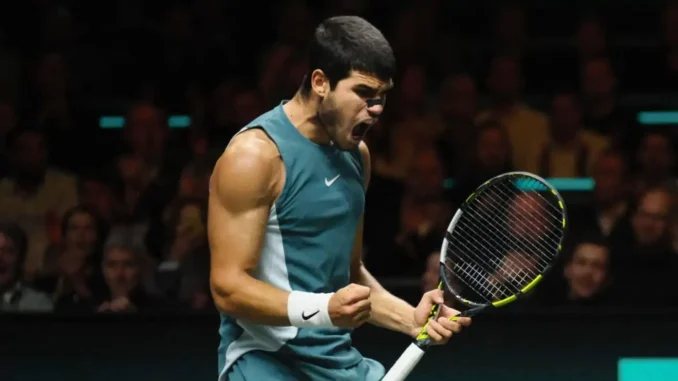
The Clay Court Conundrum: Is Carlos Alcaraz Truly King of the Surface, or Just a Hard Court Maestro in Disguise?
The world of tennis is often defined by rivalries, contrasting styles, and the ever-present debate about who reigns supreme on which surface. Carlos Alcaraz, the young Spanish phenom, has undoubtedly taken the tennis world by storm, showcasing a blend of power, finesse, and an uncanny court sense that has drawn comparisons to some of the game’s all-time greats. His prowess on clay, culminating in a French Open title, has cemented his reputation as a dominant force on the red dirt. However, a recent challenge to this narrative has ignited a fresh debate: is Alcaraz truly a clay court specialist, or is his brilliance simply a reflection of his all-around talent, equally effective on any surface?
The conversation was sparked by a former ATP player, who suggested that Alcaraz’s clay court dominance might be more perceived than real. The argument centers around the idea that Alcaraz’s game, while undeniably effective on clay, isn’t inherently better suited to the surface than to indoor hard courts. This assertion challenges the conventional wisdom that Alcaraz is a natural clay court player, a notion largely based on his success at Roland Garros and other clay court tournaments.
The former player’s perspective offers a contrarian view, suggesting that Alcaraz’s fundamental skills – his powerful groundstrokes, his exceptional movement, and his tactical awareness – translate seamlessly to any surface. “He’s not better on clay than indoor hard,” the former pro stated, highlighting the Spaniard’s versatility. This viewpoint posits that Alcaraz’s success on clay is more a product of his overall excellence rather than a specific affinity for the surface.
This perspective raises some intriguing questions. While Alcaraz’s French Open victory is undeniable proof of his clay court capabilities, it’s worth examining whether his game is fundamentally different on clay compared to other surfaces. His aggressive style, characterized by powerful forehands and a willingness to attack the net, is effective on any surface. His ability to generate spin and dictate rallies is certainly an asset on clay, but these same qualities are equally valuable on hard courts.
One could argue that the slower pace of clay courts allows Alcaraz to utilize his court coverage and his ability to construct points more effectively. The extra time afforded by the surface allows him to unleash his full repertoire of shots and wear down his opponents with relentless pressure. However, his speed and agility, crucial for success on hard courts, are equally prominent in his clay court game.
The debate also touches upon the psychological aspect of the game. Alcaraz, like many Spanish players, grew up playing on clay courts, and this familiarity undoubtedly contributes to his confidence and comfort level on the surface. However, this doesn’t necessarily mean that he’s inherently a better player on clay. It could simply be a matter of experience and ingrained habits.
“He’s just a great player,” the former ATP player emphasized, suggesting that Alcaraz’s talent transcends surface preferences. This viewpoint underscores the idea that Alcaraz’s adaptability and his ability to adjust his game to different conditions are key to his success. He’s not just a clay court specialist; he’s a complete player, capable of excelling on any surface.
This debate isn’t about diminishing Alcaraz’s achievements on clay. His French Open title is a testament to his skill and his dedication. Rather, it’s about challenging the conventional wisdom and exploring the nuances of his game. It’s about recognizing that his talent is multifaceted and that his success isn’t limited to one particular surface.
The discussion also raises broader questions about the nature of surface specialization in tennis. While some players clearly excel on specific surfaces, others, like Alcaraz, possess the versatility to thrive in any environment. This adaptability is a hallmark of truly great players, those who can adjust their game to the unique challenges of each surface and find ways to win regardless of the conditions.
As Alcaraz’s career continues to unfold, it will be fascinating to see how his game evolves and how he performs on different surfaces. He has already proven himself to be a force to be reckoned with on clay, but his performances on hard courts and grass will further define his legacy. Whether he ultimately becomes known as a clay court specialist or a true all-surface champion remains to be seen. But one thing is certain: Carlos Alcaraz is a special talent, a player who has the potential to achieve greatness regardless of the surface he’s playing on. The debate about his surface preferences is just another chapter in the exciting story of his career.
Leave a Reply